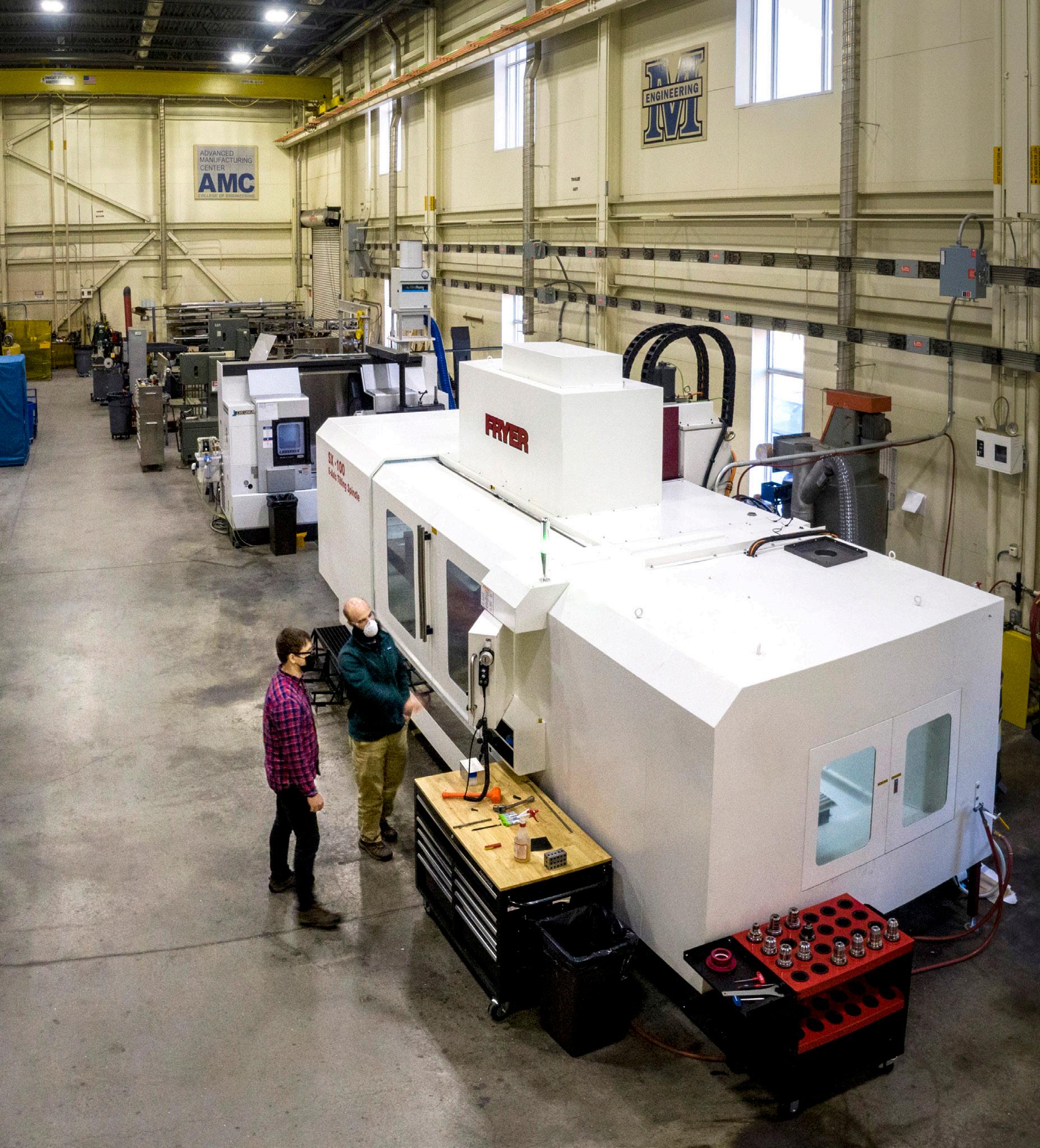
4 minute read
Enhanced capabilities
New AMC equipment furthers the future of Maine manufacturing
The University of Maine’s Advanced Manufacturing Center has completed a series of major equipment upgrades designed to enhance capabilities to support industry partners and develop workforce, as well as accelerate the adoption of additive metal manufacturing in Maine.
After a series of delays related to the coronavirus pandemic, the full suite of new equipment — made possible by two significant grants totaling $2.5 million — was installed in 2021. The upgrades include a Desktop Metal FDM additive metal machine with testing equipment, 5-axis machining center, hybrid metal additive cell, wire EDM (electrical discharge machining), 4-axis lathe with live tooling, a coordinate measuring machine and a 6KW 5-axis laser with directed energy deposition.
“The pandemic has really brought into focus the dynamic needs of Maine manufacturers,” says AMC director John Belding. “Over the last 18 months, we’ve seen firsthand how important it is to be able to meaningfully support R&D and offer companies a risk-free opportunity to experiment with new technologies, not to mention being able to deliver the skilled workforce they’ll need to expand their own capabilities in these areas. This new equipment is critical to fulfilling that dual mission, and we’re very excited to expand our work with Maine’s manufacturing sector and beyond.”
Communicating the capabilities of emerging additive metal technology (fusing small metal particles together through 3D printing to form solid metal objects) is a key goal of AMC’s Center for Additive Manufacturing of Metals (CAMM). CAMM’s initial funding came from a nearly $500,000 Maine Technology Institute (MTI) cluster initiative program grant, with matching funds from the university and 35 Maine companies, bringing the total to $1 million.
In 2019, the Maine Manufacturing Extension Partnership (Maine MEP) received a $1 million National Institute of Standards and Technology (NIST) Manufacturing Extension Partnership (MEP) Competitive Awards Program grant to support and enhance CAMM. The project aims to develop state and regional additive manufacturing capacity by making additive manufacturing services at AMC accessible to Maine businesses and entrepreneurs. The funding provided for additional measurement and laser manufacturing equipment that is used to help qualify and then machine parts.
This effort is already showing results. Since the grant was received, CAMM has completed more than 30 industry projects for 42 companies, training more than 200 engineering students per year. In the past year, AMC has assisted Maine companies to create 32 new jobs and realize $12.24 million in new sales, retained sales, new investment and cost savings.
“Our organizational mission at Maine MEP is to assist Maine’s small manufacturers to compete on a global scale, so applying for a grant to help build out AMC’s Center for Additive Manufacturing was an easy yes,” says Larry Robinson, Maine MEP president. “For today’s manufacturers, being able to compete means being innovative in both product and process — and to be innovative, one has to be able to iterate quickly and inexpensively. That is where CAMM comes in. The center provides the technology and world-class know-how to assist Maine manufacturers to rapidly iterate their new product and process ideas.”
Maine MEP is a public-private partnership and an affiliate of NIST under the U.S. Department of Commerce. It facilitates economic development in Maine by delivering technical services and workforce training solutions to Maine’s small manufacturers.
Workforce development helps build resilience into Maine’s manufacturing sector, one of the central goals of a $1.5 million grant, also awarded in 2019, that helped fund the purchase and installation of state-of-the-art additive and subtractive manufacturing equipment. That money includes a $750,000 investment from the U.S. Economic Development Administration, with matching funds from UMaine’s Office of the Vice President for Research and College of Engineering, as well as the Maine Technology Institute.
With the new machinery, AMC is able to offer companies innovative technical assistance and access to cutting-edge technology, while students are developing the skills they’ll need to excel in the increasingly technical 21st-century manufacturing workforce.
“This new equipment is very relevant to the industry, so we’re able to do more projects with Maine companies to show them the benefits of the technology,” says Belding. “Simultaneously, we’re training students who will enter the job market well prepared to help businesses adopt and use it themselves.”
This all adds up to good news for Maine’s manufacturing sector and the companies that depend on it.
The full suite of new equipment — made possible by two significant grants totaling $2.5 million — was installed in 2021. The upgrades include a Desktop Metal FDM additive metal machine with testing equipment, 5-axis machining center, hybrid metal additive cell, wire EDM (electrical discharge machining), 4-axis lathe with live tooling, a coordinate measuring machine and a 6KW 5-axis laser with directed energy deposition.







